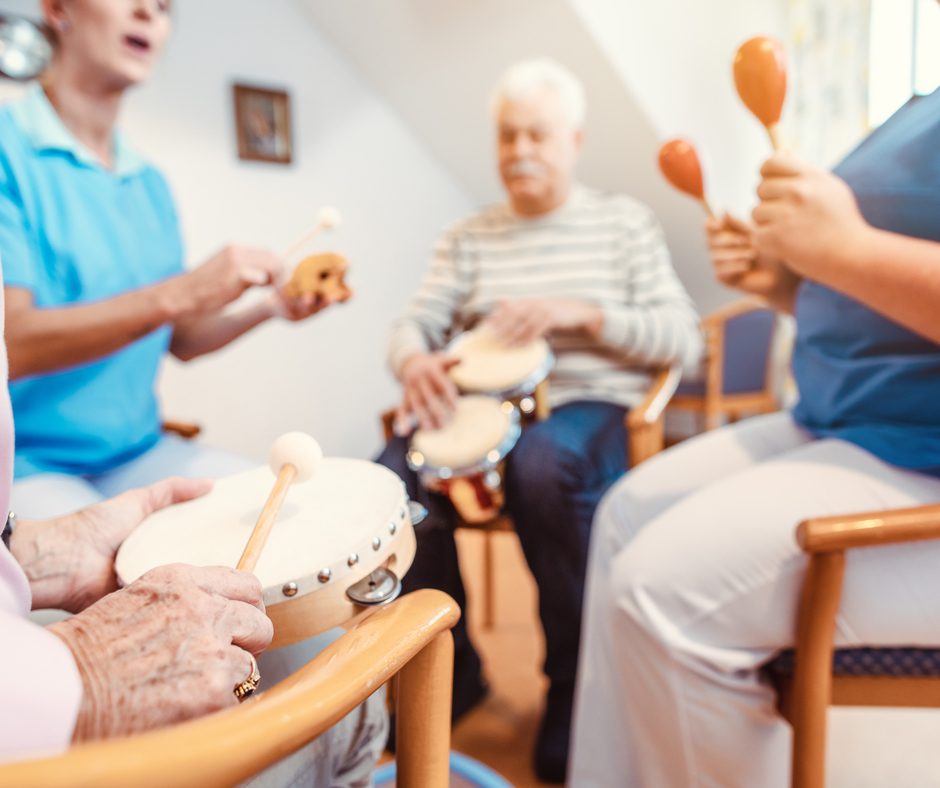Sometimes music is the best medicine
Ever had a bad day, listened to your favorite music and instantly felt better? Or felt a sense of community at a concert or dance? Or heard a song from years ago that brought back a flood of memories and emotions? Then you know that music has the power to lift spirits and revive memory.
Music therapists have harnessed the power of music to improve the quality of life for seniors. Age-related problems such as stress, depression and chronic pain can benefit from music therapy. Here are just a few benefits of music therapy for seniors:
Stress reduction — Listening to music can help you deal with stress and anxiety. Music therapy programs for seniors use songs with certain rhythms, themes or lyrics to help people relax.
Socialization — Music brings people together. Joining others to make or listen to music can spark friendships and broaden your social network. If you’re struggling with loneliness, music therapy activities can improve your social and emotional well-being.
Inspire movement — Playing music can motivate older adults to get moving, whether it’s by dancing, clapping or simply tapping their toes. Many music therapy programs use drums or tambourines to encourage seniors to participate and make their own music.
Improve memory — Studies show that people remember information more easily using a musical mnemonic. It’s not surprising; it’s how we learned our ABCs as children. Studies also suggest that simply listening to instrumental music you like may help improve memory and cognitive skills.
WHY MUSIC IS UNFORGETTABLE, EVEN FOR SOMEONE WITH DEMENTIA.
We’ve all had the experience of hearing a song from the past that took us back to where we were when we first heard it. Sights, sounds and emotions associated with the song come immediately to mind. But try to remember something particular about that time without the music, and the memories aren’t as immediate or emotional.
Researchers at the University of Leeds think that memories from our formative years remain highly accessible to us later in life largely because of the emotions attached to them. Who can forget their first kiss or first prom? The emotions we felt during these momentous events (or so it seemed at the time) get wired into our brains for good.
The music that played during our formative years gets linked to those memories. Even music that played in the background — on the radio and in bars, clubs and bedrooms — got attached to those times when everything was new and exciting. This may explain why songs you remember but don’t particularly like still evoke vivid memories. Like it or not, they’re part of the soundtrack to the most vital years of your life. And for people with dementia, personally meaningful songs from the past can bring those memories, thoughts and emotions to the fore.
OUR BRAINS ARE WIRED FOR MUSIC.
Neuroscientists at the University of California studied the relationship between Alzheimer’s patients and music. They found that music activates the medial prefrontal cortex, just behind your forehead. It serves as a hub for music, memory and emotions and is one of the last areas of the brain to atrophy as a result of Alzheimer’s. This explains why a person with dementia still remembers the lyrics to an old favorite, but not the day of the week or the street where they live.
When we actively make music, as opposed to passively listening to it, we engage another part of the brain, the cerebellum, that controls balance and movement. Music therapists may begin with passive listening to live or recorded music, but then graduate to getting individuals to play an instrument or sing along to a familiar tune. A drumming circle, for example, gets people moving, helps maintain strength and engages more regions of the brain.
MUSIC THERAPY IS HEALING AT EVERY STAGE OF DEMENTIA.
Studies have shown that people with Alzheimer’s or other forms of dementia respond to music at all stages of the disease. In the early stages, listening to music can help people relax and reduce depression. Singing can boost brain function and mood. Music therapy groups can challenge cognitive skills and encourage social interaction.
In the later stages of dementia, music can help calm agitation or aggression. It can awaken people who have become isolated and help them become more engaged and aware of their surroundings. Even when verbal communication has been lost, moving to music or dancing with your spouse can help you stay connected.
A PERSONALIZED APPROACH TO MEMORY CARE.
Music therapy is just one way we help residents with memory loss stay connected and engaged. To learn more about our personalized approach to memory care, visit our memory care page.



